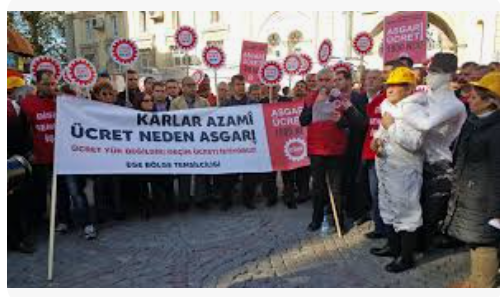Turkish government announced a 30% increase in the minimum wage for 2025, setting the monthly salary at ₺22,104 ($630.36). The decision came after multiple sessions of the Minimum Wage Determination Commission throughout December. While the hike was meant to compensate workers for inflation, it fell short of demands from labor unions, reigniting debates over economic fairness and inflation strategies.
Labor unions, including the Confederation of Turkish Labor Unions (TURK-IS), had pushed for a 70% raise to ₺29,583, citing rising costs of living. However, the final decision left many unsatisfied, sparking criticism regarding wage policies and economic priorities.
Minimum wage is very important in Turkey in terms determining affluence and inflation, because 30-50% of the active work force is estimated to draw an income equal to or around the minimum wage. They also serve as benchmark for other wages and salaries. Higher wage hikes temporarily improve the well-begin of the working class, unless they are accompanied by a burst of inflation. This is the big controversy among Turkish economists: Are wage hikes inflationary? Classical economists assert that it obviously does. According to research, a 30% wage hike would add 3-5% to CPI within a year.
Minimum wage is also politically very critical, because past elections, in particular 31st of Msarhc local elections demonstrated clearly that low wage and pension hikes cause large number of voters to protest AKP by voting for opposition parties. In fact, the main opposition party CHP has built its 2025 strategy on protesting the low wage hike and inviting blue collar workers to rally across the nation.
Left-leaning economists warn that the increase may not keep pace with inflation rates, as essential goods and housing prices continue to surge. Prof Korkut Boratav, a renowned economist, in talking to Türkiye Today, highlighted that the wage hike fails to reflect the actual cost of living, especially in major cities like Istanbul, where even two standard incomes are often insufficient to cover rent and utilities.
Boratav
argued that the thin wage increase may serve as a mechanism to redistribute wealth in favor of the state and capital owners. He pointed out that while wages rose by 30%, the government increased its tax collection rates—known as the revaluation rate—by 44% for 2025. This move ensures higher state revenue while keeping wages below inflation-adjusted levels.
Widely known Turkish economist Cuneyt Akman labeled the decision as inadequate, asserting that the wage hike “fails by every measure.”
Akman criticized claims that higher wages fuel inflation, pointing to international research—including Nobel-recognized studies—that refute such theories. He argued that real wages have been falling, contradicting the policies of the government aimed at price stability. Instead, Akman advocated for wage policies that boost purchasing power as a means of fighting inflation.
Akman, in his remarks to Türkiye Today, also argued that the inadequate wage hike technically benefits neither workers nor businesses. He noted that rising costs and limited wage increases could suppress domestic demand, ultimately harming growth.
The lack of mid-year adjustments and concerns about further erosion of purchasing power fuel doubts about the policy’s long-term impact.
The solution: Direct income support
Left-leaning economists err in thinking that poverty can be alleviated by legislation. Compensating workers for past inflation raises inflation expectations and stickiness, creating a vicious cycle. The solution is to determine the minimum income a family needs to cover its basic needs and for the state to pay the difference between this sum and the family’s income as direct income support. While this measure, too, would be inflationary, at least it won’t place the burden of increasing the welfare of workers on the private sector, which erodes competitiveness. It is also more fair than the current system, because it targets achieving adequate household incomes, rather than compensating a single wage-earner in families of different sizes.
As regards inflation, the only solution is to index the minimum wage to Central Bank’s inflation target. This would leads to acute short-term pain, but would rapidly disinflate the economy, creating log-term economic benefits. Such a measure should be accompanied by increasing taxation on the wealthy and fighting tax evasion to instill a notion of shared sacrifice to minimize political fallout.
Comments by Atilla Yesilada
IMPORTANT DİSCLOSURE: PA Turkey intends to inform Turkey watchers with diverse views and opinions. Articles in our website may not necessarily represent the view of our editorial board or count as endorsement.
Follow our English language YouTube videos @ REAL TURKEY: https://www.youtube.com/channel/UCKpFJB4GFiNkhmpVZQ_d9Rg
And content at Twitter: @AtillaEng
Facebook: Real Turkey Channel: https://www.facebook.com/realturkeychannel/
